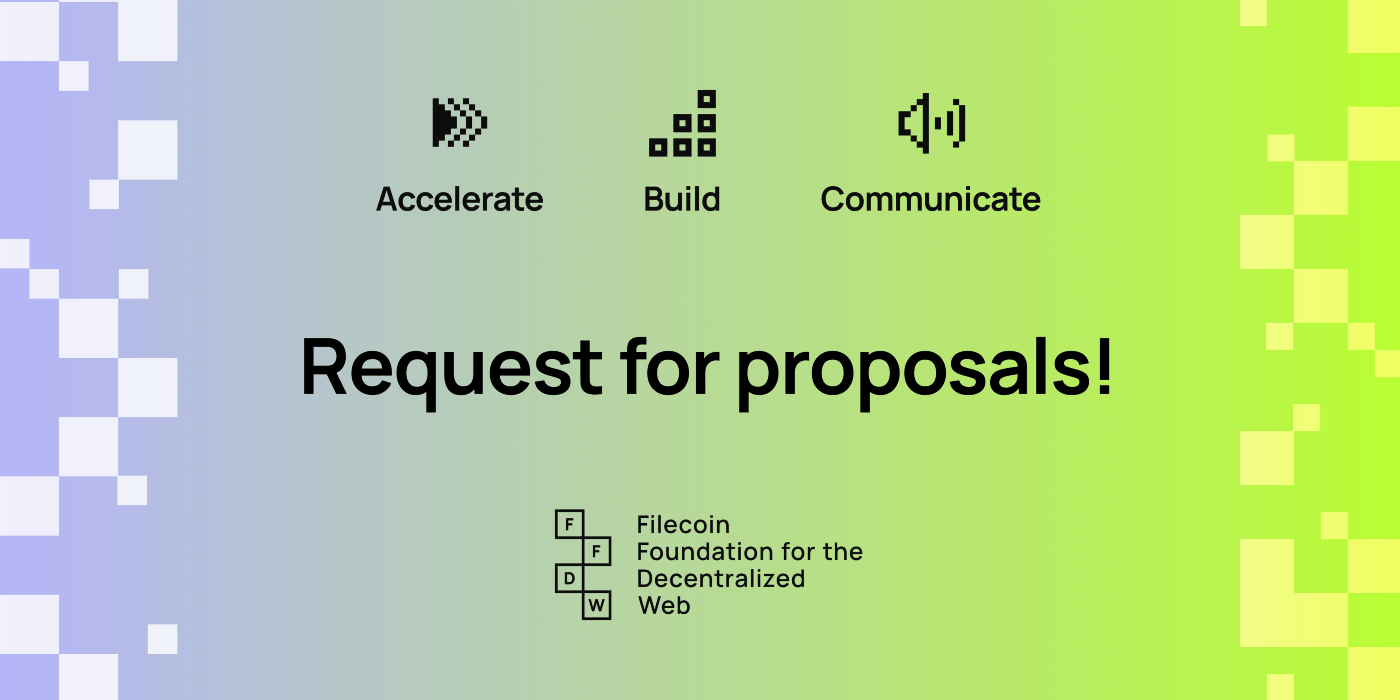Announcing Filecoin Foundation for the Decentralized Web’s First Open Request for Proposals

Today, Filecoin Foundation for the Decentralized Web (FFDW) is launching an open request for proposals (RFP). We’re looking for projects that support our core mission — to ensure the permanent preservation of humanity’s most important information. We do this by stewarding the development of open-source software and open protocols.
Our three goals are to:
- Accelerate the adoption of open, decentralized technologies.
- Build communities of builders, users, and champions of open, decentralized technologies.
- Communicate the values and benefits of open, decentralized technologies to wider audiences.
We pursue these goals through three lines of effort: development, education, and research.
Development: FFDW works to drive the development and use of open, decentralized technologies, particularly those that enable the decentralized storage of humanity’s most important information.
As part of this work, we aim to foster the creation of a decentralized digital library along with a broad community of online archivists, coders, creators, and advocates. Projects we seek to fund along these lines could include tools that allow culturally significant organizations, such as universities, non-profits, galleries, libraries, and museums to utilize open, decentralized technologies.
Education: Decentralized technology can be tough to wrap your head around, but it doesn’t have to be. This line of effort seeks to provide education on the values and benefits of open, decentralized technologies.
It also seeks to empower users and creators — specifically young developers and those interested in broadening their professional skills — so that they can quickly adopt and contribute to open-source, decentralized technologies.
Research: Our research interests are broad, but there are a few that we consider most pressing. Strong user research is critical to ensure that open, decentralized technologies are developed to support the needs and use cases of global communities. We believe it is crucial to fund the research that will drive new, innovative decentralized solutions to the world’s needs.
RFP Areas of Focus & Scope
To best achieve these three lines of effort, we seek proposals to address the specific topics below. Proposed projects may range from one to three years.
- Creator and Developer Training: We are interested in proposals for two aspects of creator and developer training. First, empower and inform the next generation of creators and developers, currently in education or in junior roles, so that they can understand, and adopt decentralized technology into their work and lives. Second, give existing Internet developers the tools they need to incorporate decentralized technology into their work. (Up to $1.75M per year)
- Public Education: Introduce the public to the decentralized web. These programs should inform diverse global audiences about the values, benefits, and compelling use cases of decentralized technologies. (Up to $100,000 per year)
- Universities and GLAM (galleries, libraries, archives, and museums) Institutions: Drive the development and use of technologies to enable a global decentralized library for all. Projects in this area might pursue efforts such as industry-specific platforms that make uploading information to decentralized storage user-friendly and accessible. (Up to $800,000 per year)
We’re especially keen to see proposals from organizations based outside of traditional tech hubs. We welcome ideas that come from or lift up communities currently underserved by existing tech tools and practices, as well as novel forms of technological development that work within and close to those underserved communities.
We intend to allocate up to $1.75 million dollars per year, combined, to the Creator and Developer Training area. We intend to allocate up to $100,000 per year to the Public Education area, and up to $800,000 per year to the Universities and GLAM Institution area. Proposed projects may range from one to three years in length.
Timeline
As part of our commitment to collaboration, we believe that everyone works best when expectations and timelines are clearly defined. To help our potential future partners manage this RFP, below are the key dates for this process.
- April 18: Open call launches; we welcome your questions
- May 6: Answers to all grantee questions publicly posted
- June 21: Close date for open call at noon PT
- July 22: FFDW will notify all applications of decisions made
- Sept 30: All funds distributed